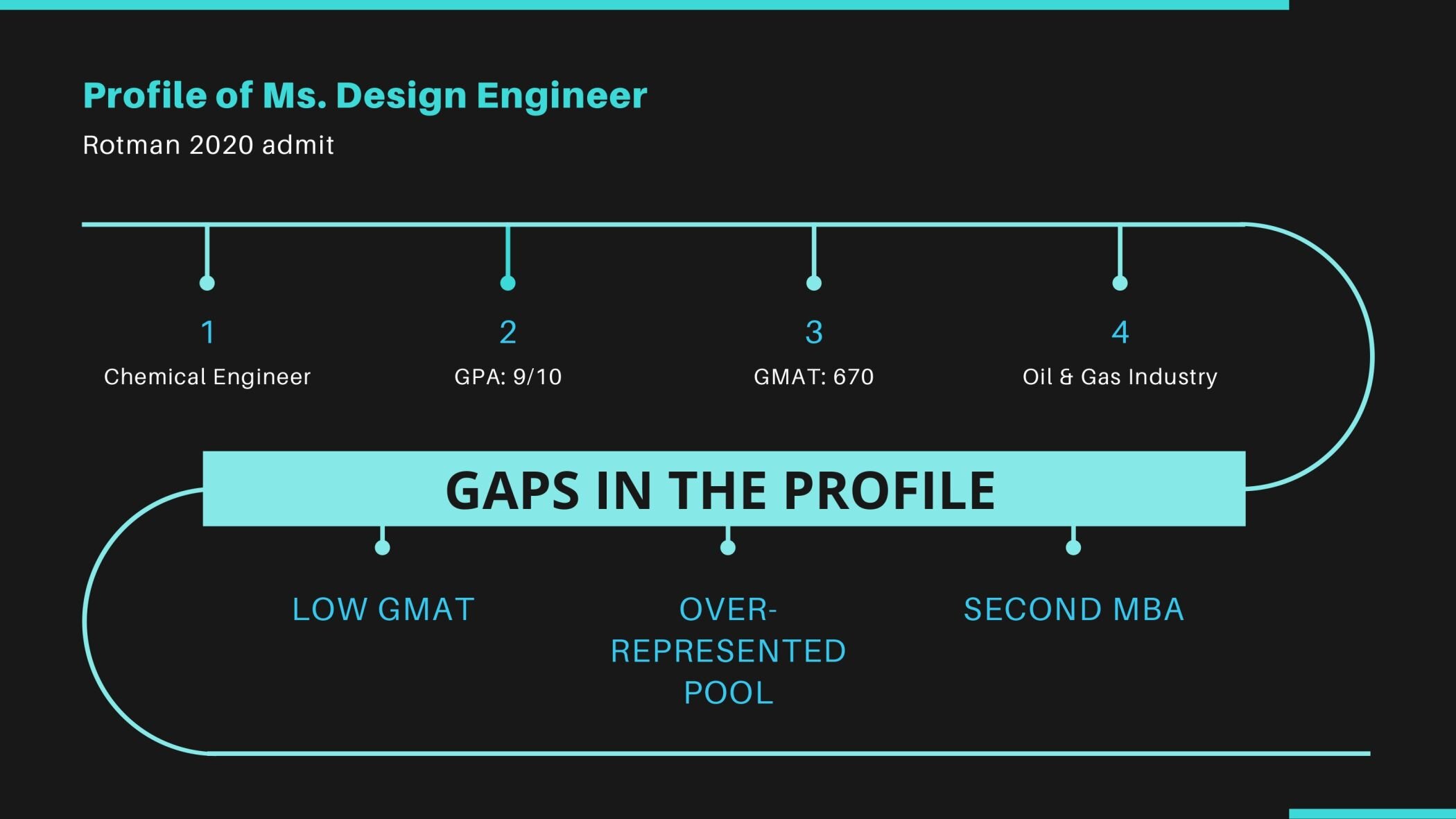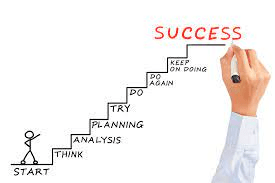LOW GMAT SUCCESS STORIES: Journey to Rotman
In this article, we are speaking to a chemical engineer who supposedly has a regular profile of an Indian engineer with a “low GMAT score” of 670 and still cracked the admissions of one of the best business schools in Canada (Rotman) to embark on his journey for her second MBA.
Through the journey of a successful candidate, we are here, addressing issues like how to bring uniqueness in your applications despite belonging to an over-represented MBA applicant pool, how important is GMAT for MBA, how to choose the right MBA programs and what Rotman looks for in a candidate.

Q: AT WHAT POINT IN YOUR CAREER DID YOU DECIDE THAT YOU NEED A SECOND MBA ABROAD?
I have been thinking about a second MBA for a long time. But once when I got the opportunity to visit and work in my company’s London office, my interaction with many different personalities from varied cultures inspired me to start considering global options for my second MBA.
Also, pursuing a second MBA can be a golden opportunity for me now because I belong to the Oil & Gas Industry and it’s very niche. Now, with the pandemic, the industry is going through a rough time and so from the career point of view, it made sense to do an MBA now and pivot my career to consulting.
Q: BEING A 670 GMAT, WHICH IS SUPPOSEDLY A “LOW GMAT SCORE”, DID YOU FEEL UNDER-CONFIDENT AS REGARDS YOUR CHANCES TO THE TIER 1 BUSINESS SCHOOLS?

I received my GMAT score back in 2019 and vividly remember feeling unsatisfied, as it was lower than I had achieved in my practice tests. At that time, I reached out to Shantanu for advice on whether I should retake the exam. Since I had time, he encouraged me to give it another shot, and I did—not just once, but several times. Unfortunately, my efforts didn’t yield the results I hoped for.
As I reflect on this journey in 2024, I’ve come to realize that having a low GMAT score can be acceptable, especially if you have a strong overall profile. Much depends on how you communicate your experiences and achievements to the admissions committees, which can help offset a lower GMAT score. Although I recognized that a 670 GMAT is considered low, particularly for someone from an over-represented applicant pool like an Indian engineer, I remained hopeful. Shantanu consistently reminded me that it’s the holistic view of my profile that truly matters in the admissions process.
Q: AT WHAT POINT IN YOUR MBA APPLICATION PROCESS DID YOU FEEL THE NEED FOR A CONSULTANT?
One of my biggest challenges, which I believe many Indian applicants can relate to, was having a low GMAT score in a highly competitive MBA applicant pool filled with Indian engineers. I recognized that I wasn’t in a strong position, and with a low GMAT, it was crucial for me to write outstanding essays in my MBA applications to capture the attention of the admissions committees. To achieve this, I needed a consultant who not only had a thorough understanding of the schools but also took the time to understand my unique background and experiences.
I was clear about what I wanted in a consultant, and I found Shantanu to be the perfect fit. His extensive knowledge of various schools and the structured approach he employs throughout the application process instilled confidence in me. This made me feel assured that my low GMAT would have minimal impact on my overall application, as he helped me effectively showcase my strengths.
Q: HOW WOULD YOU WANT TO DESCRIBE YOUR WHOLE MBA APPLICATION JOURNEY? HOW YOU STARTED, WHAT HURDLES YOU FACED AND WHAT DO YOU THINK YOU HAVE GAINED FROM THE WHOLE JOURNEY?
For me, it was quite a journey! I began working with MBA and Beyond eight months before the application deadline. Our first step involved a comprehensive content-gathering process, where I received a document filled with hundreds of questions to answer. This not only prompted me to reflect deeply on my experiences but also allowed my friends and family to provide their insights. Their feedback helped me eliminate personal biases and present a more well-rounded view of myself.
Once the branding process was complete and we established the theme and direction of my application, we moved on to the essays. We held extensive sessions, working through at least 4 to 5 drafts for each question before arriving at the final version.
My biggest challenges were my goals essay and my low GMAT score. With so much happening, I needed to carefully consider every aspect of my goals and life, which required extensive research. The best part was having Shantanu by my side—he was patient and guided me in the right direction throughout the process. Recognizing the disadvantages of a low GMAT and being part of an over-represented applicant pool, I started my MBA applications much earlier than most.
Q: ONE OF THE MOST IMPORTANT DECISIONS FOR MBA ASPIRANTS IS TO CHOOSE THE “RIGHT” SCHOOLS. WHAT EXACTLY THIS “RIGHT” MEANT FOR YOU AND HOW DID YOU CHOOSE THE RIGHT MBA PROGRAMS FOR YOURSELF?
I believe that the decision about which schools to apply to should be deeply personal and stem from within. The first step in selecting the right MBA programs is to reflect on your own goals, career aspirations, and preferences. This introspection can help you cut through the noise and distractions that often surround the decision-making process.
For me, geography played a crucial role in my decision-making process. I had already ruled out the USA due to visa concerns and was eager to explore options in the UK, where I had previous work experience and a fascination with the culture I encountered. Once I narrowed down the geographical locations, we began researching schools, networking with alumni, and evaluating each MBA program based on various factors such as career opportunities, quality of life, and the school’s culture. I still vividly remember that it took us around 21 days just to finalize the list of schools.
SEE THE MAIN FACTORS THAT CAN HELP YOU CHOOSE THE RIGHT MBA PROGRAMS
Q: SO, NOW THAT YOU ARE A ROTMAN ADMIT WITH A 20,000 CAD SCHOLARSHIP, WHAT DO YOU THINK IS THE KEY TO CRACK ROTMAN’S MBA ADMISSIONS?
To secure a place at Rotman, along with a CAD 20,000 scholarship, I believe the key lies in presenting a well-rounded and authentic application. Here are a few critical elements that contributed to my success:
- Self-Reflection: Understanding my career goals, strengths, and unique experiences was essential. This introspection helped me articulate a clear narrative in my essays and interviews.
- Strong Essays: Rotman values candidates who can think critically and express their ideas effectively. Crafting essays that reflect my personality, motivations, and how I align with Rotman’s values made a significant difference.
- Networking: Engaging with Rotman alumni and current students provided valuable insights into the program’s culture and offerings. This networking helped me tailor my application to demonstrate my fit within the Rotman community.
- Relevant Experience: It was crucial to highlight my professional achievements and how they relate to my future goals. I showcased how my background would contribute to classroom discussions and group projects.
- Genuine Interest in the Program: I demonstrated my enthusiasm for Rotman by articulating specific aspects of the program that attracted me, such as its focus on integrative thinking and experiential learning opportunities.
- Preparation for Interviews: Being well-prepared for the interview was vital. I practiced articulating my experiences and aspirations clearly and confidently, conveying my passion for the program.
Ultimately, authenticity and a clear vision for my future played pivotal roles in my successful application to Rotman.
Getting into Rotman’s MBA program is about being true to yourself and sharing your unique story. With the support of MBA and Beyond, I could reflect on my experiences and craft a clear vision for my future. I created a compelling application by showcasing my genuine passion for the program and how my background aligns with Rotman’s values. It’s really about being authentic and demonstrating how you’ll contribute to the Rotman community while making the most of the program’s incredible opportunities.
If you need more in-depth information about any particular aspect of the application process, interviews, and course structure, feel free to hop on a 1:1 call with our team of experts.